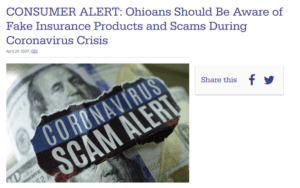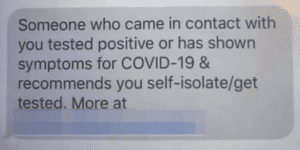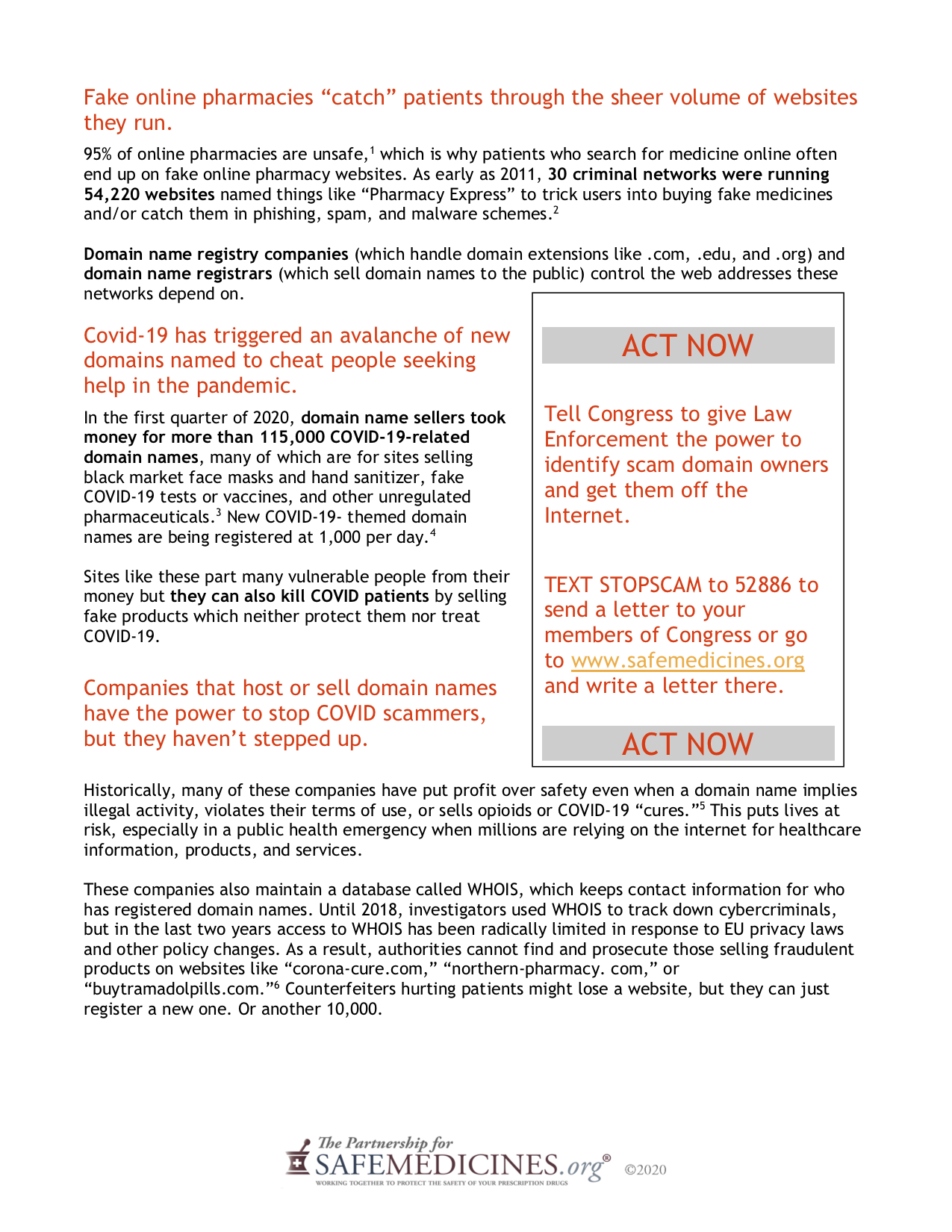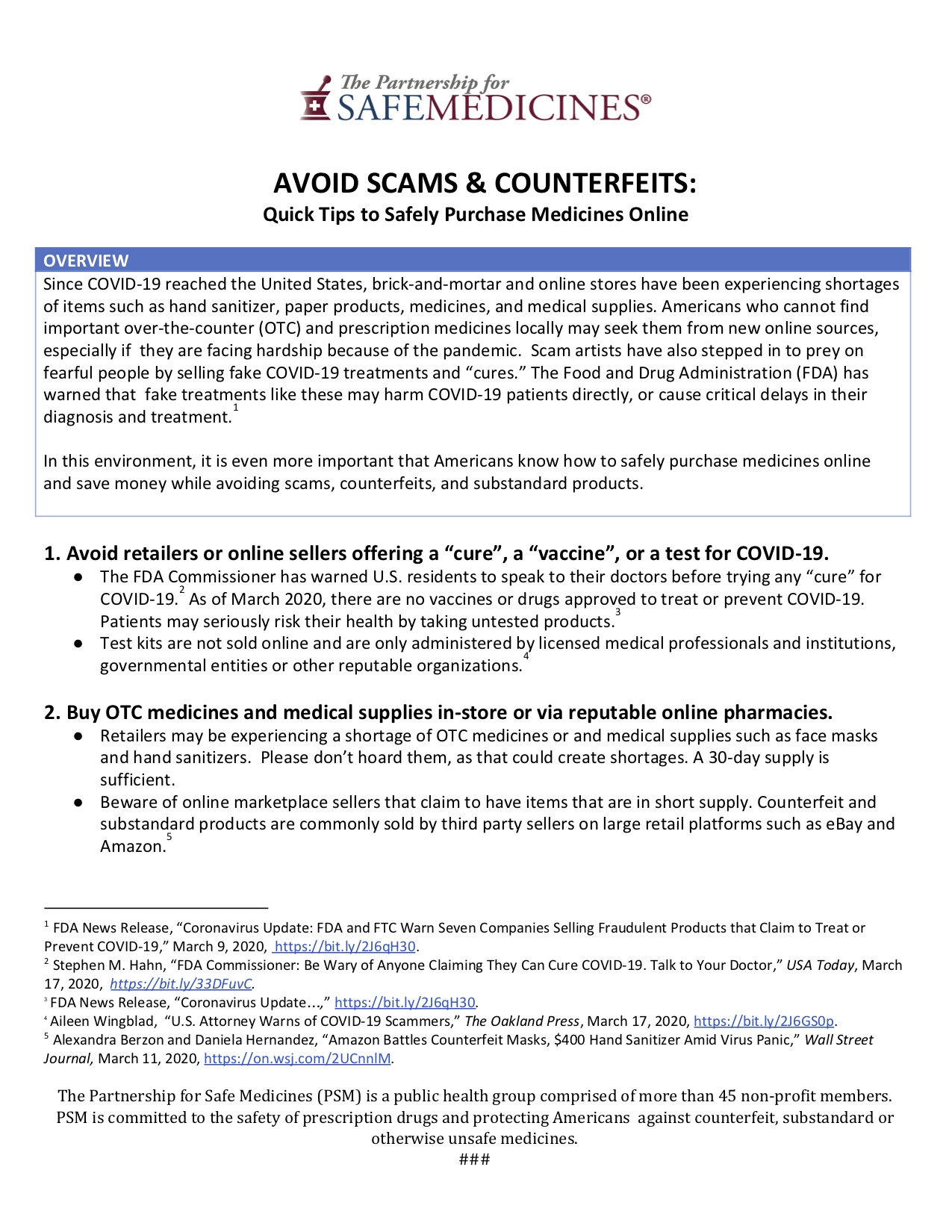May 13, 2020 video: Financial #COVIDscams
The Partnership for Safe Medicines typically stays close to prescription drug safety and issues that affect the secure supply chain that ensures it. As we’ve focused these last few weeks on COVID-19 scams related to medicine and medical supplies, however, another population of scammers has been exploiting Americans. This week we’re calling out financially-focused covidscams, which comprise a large part of the $13.4 million that U.S. citizens have lost to fraud since the beginning of the year.
Insurance Cons

Source: Ohio Department of Insurance
In late April the Ohio Department of Insurance warned that criminals impersonating insurance agents were calling Ohio residents to sell fake health insurance products, such as special COVID-19-specific health insurance, telehealth-only insurance, and “Trumpcare.” The callers ask consumers to provide personal and banking or credit card information, then steal money from them through fraudulent premium billings. Ohio also reports con artists selling fake travel insurance, claiming it will cover plans cancelled in the pandemic. Others solicit health insurance information in exchange for coronavirus test kits and treatments that never appear—but the scammers have all they need to submit false insurance claims for their own profit.
Regulators in California, Colorado, Kansas, Utah and other states have also issued warnings.
How can Americans protect themselves from this kind of insurance fraud? First of all, avoid buying any kind of insurance, but especially health insurance, in response to an unsolicited telephone call. Second, check the caller’s license on the relevant state insurance regulator’s website. Ohio’s, for example, is here.
Phishing for Stimulus Payments
In another wide-ranging online con, hackers send fraudulent emails (or texts) that purport to be from the IRS or the Treasury Department. These phishing emails have links to fake copies of the IRS’s real “Get my Payment” page, which harvest information to steal stimulus payments.
This is an old scam repurposed for the coronavirus era. In 2013, large criminal networks used stolen social security numbers to file $30 billion in refunds before people had done their taxes. Investigators stopped or recovered $24 billion of that total, but there is still the other $6 billion to consider. These networks are poised to grab a great deal more money: as of last month more than 149,000 suspicious website names with the term “stimulus check” in them had been newly registered.
In 2017, the IRS posted a factsheet warning consumers not to be taken in by these kinds of schemes. IRS very rarely calls, emails or texts taxpayers; almost all contact with the IRS will come by mail.

Source: IRS
Fake COVID-19 Exposure Text Alerts

Source: CNN
CNN recently covered a fraudulent texting scheme in which cell phone users receive a text that tells them that they have been exposed to COVID-19 and sends them to a website “for more information.” Schemes like these, which have been reported in many U.S. states and in the United Kingdom, can expose cell phones to malware that logs your keystrokes or send users to websites that—like the phishing emails above—collect information that leads to identity theft.
Law enforcement needs help to protect Americans from these schemes
 Checkphish, a security firm that has been tracking COVID-19 phishing scams since the coronavirus became a global crisis, reports that the overall number of phishing websites leapt 235 percent over the course of March 2020. Though many of these sites are being hosted by U.S. companies, law enforcement is hamstrung by the inability to fully access domain name information and kick scammers offline. In last week’s video, we explained how a few bad domain name sellers are becoming a haven for scammers.
Checkphish, a security firm that has been tracking COVID-19 phishing scams since the coronavirus became a global crisis, reports that the overall number of phishing websites leapt 235 percent over the course of March 2020. Though many of these sites are being hosted by U.S. companies, law enforcement is hamstrung by the inability to fully access domain name information and kick scammers offline. In last week’s video, we explained how a few bad domain name sellers are becoming a haven for scammers.
We’re pushing for legislation to force the negligent domain name sellers to uphold the industry best practices. Text ‘STOPSCAMS’ to 52886 send a message to Congress about this problem, or go to our website at www.safemedicines.org to write your members of Congress a letter.
And don’t forget we have tips on our website for avoiding scams and saving money safely on your medication on our website in English and Spanish.
Sources for this week’s video:
- “COVID-19 Scam Reports, by the Numbers,” Federal Trade Commission, April 15, 2020.
- “CONSUMER ALERT: Ohioans Should Be Aware of Fake Insurance Products and Scams During Coronavirus Crisis,” Ohio Department of Insurance, April 25, 2020.
- “Don’t Let COVID-19 Infect You With Insurance Fraud,” California Department of Insurance.
- “Consumer Alert: Division of Insurance Warns Coloradans About High Pressure Sales Tactics for Health Insurance,” Colorado Department of Regulatory Agencies, April 14, 2020.
- “Beware of Coronavirus Insurance and Security Scams,” Kansas Insurance Department.
- “Senior Alert COVID-19 Scams Spreading,” Utah Insurance Department Fraud Division.
- Ohio Department of Insurance Agent / Agency Locator, Ohio Department of Insurance.
- “Scammers Are Using Fake Coronavirus Stimulus Payment Sites to Steal Your Money,” CNBC, April 23, 2020.
- Stolen Identity Refund Fraud, U.S. Department of Justice.
- “How to Know it’s Really the IRS Calling or Knocking on Your Door,” Internal Revenue Service, April 19, 2017.
- “Coronavirus Pandemic Generates New Fraud Strains: COVID-19 Scams on Computers, Smartphones,” USA Today, April 4, 2020.
- “Beware of These Fake Text Messages and Robocalls Going Around About the Coronavirus,” CNN, April 19, 2020.
- “True Claim: COVID-19 Proximity Text Messages Are Fake,” Reuters, April 20, 2020.
- COVID-19 (Coronavirus) Phishing Scam Tracker Global Online Dashboard, Checkphish.
- “New Research: Phishing Sites Spike 235% During the COVID-19 Pandemic,” CheckPhish, March 26, 2020.
There are many more scams we can’t fit into our weekly episode. Follow us on Facebook, Twitter or Linkedin to get them. Read all our COVID-19 coverage.
Domain name reform is critical for patient safety
Tell Congress to give law enforcement the power to identify scam domain owners and get them off the Internet.
Share our one-pager about domain name reform to help others understand why. TEXT STOPSCAM to 52886 to send a letter to your members of Congress, or submit your letter here.
Adopt our Covid Safety campaign!
Post our one pager to your website and to social media. Use the hashtag #covidscams to help raise awareness of criminals using the crisis to prey on people. Drop us a note at editors@safemedicines.org to let us know you're helping!

